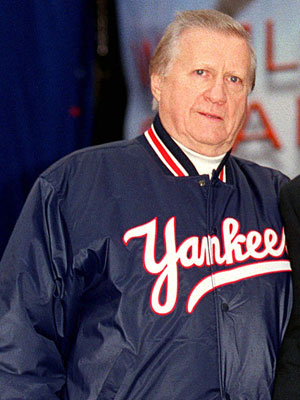He grew up in northern New Jersey and the St. Alban’s District of Queens, and the first time he ever saw the New York Yankees play, Mickey Mantle hit a walk-off home run.
Needless to say, Santa Barbara Foresters manager Bill Pintard was thrilled when the Bronx Bombers asked him to work as a part-time scout on the West Coast in 1997.
“I had to think about it for about 10 seconds before I said yes,” said Pintard.

George Steinbrenner (photo from NYmag.com)
So from fan to employee he shifted, and while Pintard never had any direct relationship with “The Boss,” he shared some insight on the legacy left by longtime Yankees owner George Steinbrenner on Tuesday, less than a day after the polarizing baseball magnate passed away from a heart attack at age 80.
Pintard worked for the organization until 2002, when he left the Yankees and accepted his current position with the Los Angeles Angels of Anaheim — a decision he has not one ounce of regret about.
“The day I was hired by the Yankees was one of the best days of my life, but the day I left the Yankees was as well,” he said.
It’s well-known that Steinbrenner was a win-at-all-costs owner, but the extent of his perfectionism and the control he seized at all levels of the organization are what really stand out.
“Whenever he would show up at a Minor League complex, the message would be passed over the phone from department to department that ‘The eagle has landed,'” recalled Pintard. “One time, the story goes that he went up to the front door of a facility and the doormat wasn’t straight, leaving the door ajar. He bent over and straightened it out, then immediately called the maintenance person in charge of that area. He had his hand in everything from the cleaning crew up to the manager.”
Steinbrenner was known to fire people as a knee-jerk reaction, even giving the boot to secretaries in the front office after a losing season, as if they had something to do with it. He fired and re-hired Pintard’s all-time favorite manager, Billy Martin, five times. That’s what made him loathsome to many, but in a place like New York, it’s also what made him a hero. After all, despite some under-achieving periods, the Yanks won 11 pennants and seven championships in The Boss’ 37 years at the helm.
“He had the ultimate passion for the Yankees and the ultimate desire for them to win. I don’t know how much he thought about people’s feelings, but it’s a performance business and you have to perform. The best thing you can say about him is that he was a winner. He was obsessed with winning, and he won a lot,” said Pintard. “His methods worked for George, because he had a big ego. They worked for New York as well, because the city itself is very similar. To New Yorkers, everything revolves around New York, and that was the way he thought about the Yankees.”
As far as the ‘feelings’ of employees go, Dodgers manager Joe Torre (who managed the Yankees from 1996-2007) was a bit more direct when discussing Steinbrenner’s leadership with the Los Angeles Times on Tuesday.
“He had no regard for anyone else’s life.” Torre said. “But those were the ground rules.”
There are some owners nowadays who are criticized for caring about profits more than winning, but to George Steinbrenner, they went hand-in-hand. By launching the YES (Yankees Entertainment and Sports) Network in 2002, he brought more revenue to the franchise than any World Series championship could. That helped him to continue to draw the biggest talents and build the mega-rosters we’ve seen on the Yankees in recent years — A-Rod, Teixeira, Sabathia and others. While the Yankees Farm system can proudly proclaim Derek Jeter, Andy Pettitte, Jorge Posada and Mariano Rivera as its own, there was always a way to lure the best if needed.
To lower-budget teams and their fans, it was perhaps the biggest reason to think of George Steinbrenner with disdain.
“A lot of Steinbrenner’s successes came because of the money he had to work with, and he was just tremendous at maximizing revenue. A lot of organizations, like the Twins, have had to win in other ways. The Yankees have always had a good farm system, but sometimes whether or not the they drafted well it wouldn’t matter because he could go out and get what they needed. You have to respect that he made it possible to do that,” said Pintard.
There will surely be numerous books published in the coming year that will look into the depths of Steinbrenner’s regime and all the outrageous things he did. They’ll talk about his strict policy on players’ facial hair (mustaches only, hair always trimmed above the neckline) and his outrageous temper. Former employees will come out of the woodwork to tell stories about what a monster he was to work for.
But those stories will be complemented by recounts of his love for his team and the gentler side of the man, which to the public was usually hidden under a dictator’s veil. Derek Jeter said this in an interview with NJ.com on Thursday:
“I think most people know him as being this vocal owner. But if you really got to know him, you realized all the great things he did, not only in the community but with the past players and former players.”
Pintard regards the Angels owner, Arte Moreno, as a winner with “more sensitivities” than Steinbrenner.
“Arte Moreno is a taskmaster, but if you’re doing the right thing you’re not gonna get knee-jerk reactions. He is very conscious of morale in the organization and opinions of the organization. That permeates every facet of his ownership,” he said.
Love him or hate him, the way in which George Steinbrenner’s iron fist permeated the New York Yankees will always be legendary.
